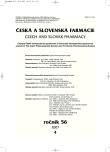-
Medical journals
- Career
Interactions of food and dietary supplements with drug metabolising cytochrome P450 enzymes
Authors: J. Nekvindová; P. Anzenbacher
Authors‘ workplace: Czech Republic ; Palacky University, Faculty of Medicine and Dentistry, Institute of Pharmacology, Olomouc
Published in: Čes. slov. Farm., 2007; 56, 165-173
Category: Review Articles
Overview
Drug side effects and toxicity and often the drug efficacy are highly dependent on drug metabolism determining the activation and/or elimination of the respective compound. In humans, cytochromes P450 are the most important drug metabolizing enzymes of the first phase of drug biotransformation. Their activity can vary due to interindividual genetic differences, but it can be changed also by inhibition or induction of the enzymes by their substrates or other compounds that are not only drugs themselves and/or drugs taken concomitantly. Often, influence on drug metabolism by compounds that occur in the environment, most remarkably in the food, is forgotten. Some commonly used herbs, fruits as well as e.g. alcohol may cause failure of the therapy up to serious alterations of the patient’s health. This review presents a brief overview of potentially dangerous nutrition factors including herbs (incl. teas, infusions) that should be considered when indicating individual drug therapy. Examples include primarily grapefruits, pomelo, star fruit, pomegranates and some other fruits, St John’s Wort (Hypericum perforatum), caffeine, as well as alcohol and cigarette smoking.
Key words:
cytochrome P450 – CYP – food – interaction – drug
Labels
Pharmacy Clinical pharmacology
Article was published inCzech and Slovak Pharmacy

2007 Issue 4-
All articles in this issue
- Applications of molecularly imprinted polymers in analytical and pharmaceutical chemistry
- Interactions of food and dietary supplements with drug metabolising cytochrome P450 enzymes
- T-2 toxin: occurrence and detection
- Voltage gated calcium channels: structure, characteristics and terminology
- A study of the properties of tablets from the mixtures of directly compressible starch and directly compressible lactitol
- The effect of polymeric dispersion type on the release of diclofenac sodium from coated pellets
- Testing of antidiabetic and antioxidative effect of the flavonoid osajin in an experiment
- Czech and Slovak Pharmacy
- Journal archive
- Current issue
- Online only
- About the journal
Most read in this issue- Interactions of food and dietary supplements with drug metabolising cytochrome P450 enzymes
- Voltage gated calcium channels: structure, characteristics and terminology
- Applications of molecularly imprinted polymers in analytical and pharmaceutical chemistry
- T-2 toxin: occurrence and detection
Login#ADS_BOTTOM_SCRIPTS#Forgotten passwordEnter the email address that you registered with. We will send you instructions on how to set a new password.
- Career

